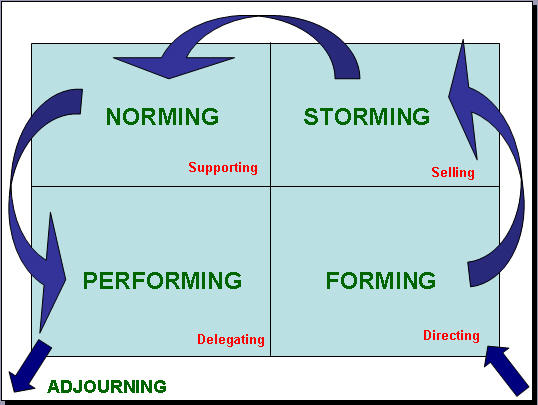The research involved teamwork and every team member had to participate actively in collecting resources, reviewing the literature, discussing the findings, and drawing the conclusions in the paper. The individual team members also participated in writing and proofreading the report. The group had to appoint a leader to ensure that there were order and a sense of direction in the activities undertaken in this project. To understand how the group activities developed, it may be necessary to use Tuckman’s Forming Storming Norming Performing Model.

As shown in this model, the first stage of teamwork is forming. At this first stage, the team members took the time to understand one another and to define the task that had to be done. Individual roles and responsibilities were still unclear at this stage, and we heavily relied on the guidance of the team leader that we had selected. The task ahead was defined at this stage and the expectations of every individual stated. The second stage is storming where team members actively got involved in coming up with ideas and discussing them based on the available materials. The roles and responsibilities of every team member were becoming clear, and the purpose of the assignment was understood by all (Goodpasture 2010). Every member was expected to sell his ideas regarding the tasks assigned to them and support their arguments with facts from books, websites, and other reliable sources.
The third stage according to this model is norming (Clayton & Hailstone 2009). At this stage, team members had understood one another, and working as a unit was not a problem anymore. Commitment, unity, and trust increased as every team member realized that they had to be successful in their roles to enable the entire group to achieve the desired success. Decision-making became easier as the materials needed for the research became accessible to all. The leader was very supportive and worked with individual team members to ensure that overall success was achieved. The final stage in this model is performing. At this stage, the group members were aware of their roles in this project and the need to coordinate very closely. In their roles, team members worked very closely to ensure that overall success was achieved.
Issues/Problems
The researchers faced several challenges during the process of conducting the research. The main problem was to gather facts and understand strategies that ASDA has been using to gain such success in the market. The researchers had to rely on books and articles written by experts who have closely interacted with this firm to understand these specific facts about it. Working as a team, sometimes it took a long before coming up with a unanimous decision. Sometimes team members were forced to make compromises to move on with the project.
Synergy
The close cooperation of different learners in addressing this assignment resulted in greater success than what would have been achieved by individual learners working independently. The team was able to collect the needed resources more efficiently. Since it took longer to come up with conclusions, the discussion, and the entire process was much detailed than it would ever have been if the assignment was done by individual students.
List of References
Berkun, S 2008, Making Things Happen: Mastering Project Management, O’Reilly Media, Sebastopol.
Clayton, M & Hailstone, P 2009, The management models pocketbook, Management Pocketbooks Ltd, Alresford.
Goodpasture, J 2010, Project Management the Agile Way: Making It Work in the Enterprise, J. Ross Publishers, Ft. Lauderdale.